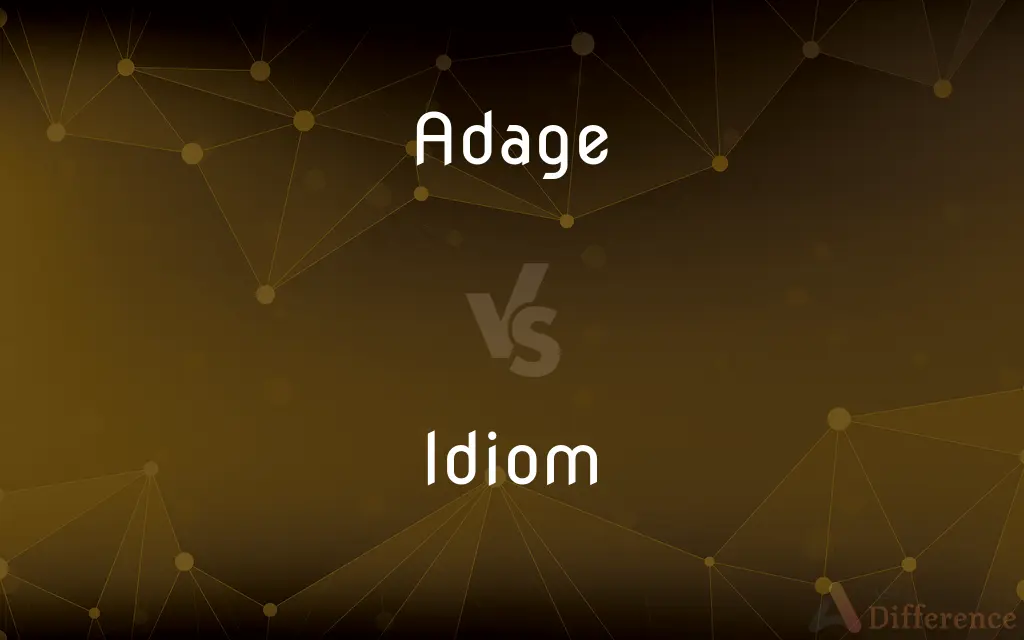Adage vs. Idiom — What's the Difference?
Edited by Tayyaba Rehman — By Maham Liaqat — Updated on April 15, 2024
Adages are traditional sayings expressing a general truth, often metaphorical and moralistic, whereas idioms are phrases where the meaning isn't directly deducible from the words used.

Difference Between Adage and Idiom
Table of Contents
ADVERTISEMENT
Key Differences
An adage is a proverb or short statement expressing a universal truth or wisdom, developed over time and often passed down through generations. On the other hand, an idiom is a set phrase with a figurative meaning that's not necessarily linked to the literal meaning of its individual words.
Adages, such as "a stitch in time saves nine," typically offer advice based on common sense or experience and are easily understood by people across different cultures. Whereas idioms, like "kick the bucket," convey meanings that can be puzzling to non-native speakers and are often culturally specific.
Adages are used to impart wisdom and ethical guidelines, which can be applied to a wide range of situations, reflecting the collective values of a society. On the other hand, idioms are more about linguistic color and personality, often used to express feelings or situations in a non-literal, more creative way.
Adages are often metaphorical but straightforward in their moral or practical advice, aiming to guide behavior. In contrast, idioms can be playful or humorous, using metaphorical language to depict unique scenarios or emotions.
The usage of adages often reinforces social norms or lessons, making them frequent in educational and parental discourse. Idioms, however, enrich everyday language, adding expressiveness and depth but requiring a good understanding of context and culture for their meanings to be fully appreciated.
ADVERTISEMENT
Comparison Chart
Definition
A traditional saying expressing a general truth.
A phrase where the meaning is not literal.
Purpose
To impart wisdom and moral lessons.
To enrich language with figurative expressions.
Clarity of Meaning
Generally clear and universally understandable.
Often obscure without knowledge of the context.
Use in Conversation
Used to advise or provide guidance.
Used to express ideas in a non-literal manner.
Cultural Aspect
Often universal, crossing cultural boundaries.
Highly culture-specific, varying by language.
Compare with Definitions
Adage
A concise statement of a principle.
The early bird catches the worm emphasizes the benefits of acting early.
Idiom
A common phrase with a figurative meaning.
Spill the beans means to reveal a secret.
Adage
An old, wise saying that has gained credibility over time.
Absence makes the heart grow fonder reflects on relationships and longing.
Idiom
A phrase expressing a concept in a non-literal way.
Seeing eye to eye means agreeing with someone.
Adage
A proverbial expression offering life advice.
A penny saved is a penny earned suggests careful saving can lead to substantial savings.
Idiom
A linguistic expression peculiar to itself grammatically.
Break a leg is used to wish someone good luck.
Adage
A universally accepted truth expressed succinctly.
Time heals all wounds offers comfort regarding recovery over time.
Idiom
A non-literal expression used in casual conversation.
Hit the sack refers to going to bed.
Adage
A traditional saying with a moral.
Honesty is the best policy teaches the value of truthfulness.
Idiom
A culturally specific expression with a metaphorical meaning.
Bite the bullet implies enduring something unpleasant without fear.
Adage
An adage (; Latin: adagium) is a concise, memorable, and usually philosophical aphorism that communicates an important truth derived from experience, custom, or both, and that many people consider true and credible because of its longeval tradition, i.e. being handed down generation to generation, or memetic replication.
Idiom
An idiom is a phrase or expression that typically presents a figurative, non-literal meaning attached to the phrase; but some phrases become figurative idioms while retaining the literal meaning of the phrase. Categorized as formulaic language, an idiom's figurative meaning is different from the literal meaning.
Adage
A proverb or short statement expressing a general truth
The old adage ‘out of sight out of mind’
Idiom
A group of words established by usage as having a meaning not deducible from those of the individual words (e.g. over the moon, see the light).
Adage
A saying that sets forth a general truth and that has gained credit through long use. See Usage Note at redundancy.
Idiom
A characteristic mode of expression in music or art
They were both working in a neo-impressionist idiom
Adage
An old saying which has obtained credit by long use.
Idiom
A speech form or an expression of a given language that is peculiar to itself grammatically or cannot be understood from the individual meanings of its elements, as in keep tabs on.
Adage
An old saying which has been overused or considered a cliché; a trite maxim.
Idiom
The specific grammatical, syntactic, and structural character of a given language.
Adage
An old saying, which has obtained credit by long use; a proverb.
Letting "I dare not" wait upon "I would,"Like the poor cat i' the adage.
Idiom
Regional speech or dialect.
Adage
A condensed but memorable saying embodying some important fact of experience that is taken as true by many people
Idiom
A specialized vocabulary used by a group of people; jargon
Legal idiom.
Idiom
A style of artistic expression characteristic of a particular individual, school, period, or medium
The idiom of the French impressionists.
The punk rock idiom.
Idiom
A manner of speaking, a mode of expression peculiar to a language, language family, or group of people.
In English, idiom requires the indefinite article in a phrase such as "she's an engineer", whereas in Spanish, idiom forbids it.
Some of the usage prescriptions improved clarity and were kept; others that yielded discordant violations of idiom were eventually revised.
Idiom
(programming) A programming construct or phraseology that is characteristic of the language.
Idiom
A language or language variety; specifically, a restricted dialect used in a given historical period, context etc.
In the idiom of the day, they were sutlers, although today they'd probably be called vendors.
Idiom
An established phrasal expression whose meaning may not be deducible from the literal meanings of its component words.
She often spoke in idioms, pining for salad days and complaining about pots calling the kettle black.
Idiom
An artistic style (for example, in art, architecture, or music); an instance of such a style.
The idiom of the expressionists
Idiom
The syntactical or structural form peculiar to any language; the genius or cast of a language.
Idiom may be employed loosely and figuratively as a synonym of language or dialect, but in its proper sense it signifies the totality of the general rules of construction which characterize the syntax of a particular language and distinguish it from other tongues.
By idiom is meant the use of words which is peculiar to a particular language.
He followed their language [the Latin], but did not comply with the idiom of ours.
Idiom
An expression conforming or appropriate to the peculiar structural form of a language.
Some that with care true eloquence shall teach,And to just idioms fix our doubtful speech.
Idiom
A combination of words having a meaning peculiar to itself and not predictable as a combination of the meanings of the individual words, but sanctioned by usage; as, an idiomatic expression; less commonly, a single word used in a peculiar sense.
It is not by means of rules that such idioms as the following are made current: "I can make nothing of it." "He treats his subject home." Dryden. "It is that within us that makes for righteousness." M. Arnold.
Sometimes we identify the words with the object - though by courtesy of idiom rather than in strict propriety of language.
Idiom
The phrase forms peculiar to a particular author; as, written in his own idiom.
Every good writer has much idiom.
Idiom
Dialect; a variant form of a language.
Idiom
A manner of speaking that is natural to native speakers of a language
Idiom
The usage or vocabulary that is characteristic of a specific group of people;
The immigrants spoke an odd dialect of English
He has a strong German accent
Idiom
The style of a particular artist or school or movement;
An imaginative orchestral idiom
Idiom
An expression whose meanings cannot be inferred from the meanings of the words that make it up
Common Curiosities
Can an adage be an idiom?
While adages are generally clear and based on truth, they can sometimes employ idiomatic expressions, but not all adages are idioms.
Do adages have cultural significance?
Yes, adages often reflect the ethical standards and common beliefs of a culture.
What is an adage?
An adage is a short, traditional saying that expresses a general truth or piece of advice.
How are adages used in language?
Adages are used to convey wisdom, morals, and advice often reflecting collective societal values.
Are idioms easy to understand?
Idioms can be challenging for non-native speakers because their meanings are often non-literal and culturally bound.
Can idioms change over time?
Yes, idioms can evolve with language and culture, sometimes altering in meaning or falling out of common usage.
What's an example of a widely used idiom?
"Piece of cake" is an idiom used to describe something very easy to do.
What is an idiom?
An idiom is a phrase or expression whose meaning cannot be understood from the ordinary meanings of the words it is made of.
How are idioms used in language?
Idioms add color and personality to language, expressing ideas in non-literal, imaginative ways.
Are adages easy to understand?
Yes, adages are generally straightforward and universally understandable due to their moral and practical nature.
Do idioms have cultural significance?
Yes, idioms can provide insights into the humor, values, and unique expressions of a culture.
What's an example of a widely known adage?
"Don't count your chickens before they hatch" is an adage advising against assuming success before it happens.
Where do adages typically originate from?
Adages often originate from ancient proverbs or religious texts, gaining credibility over time.
Where do idioms typically originate from?
Idioms usually develop organically in spoken language and can stem from literature, movies, or other cultural artifacts.
Can learning idioms help with language proficiency?
Yes, understanding and using idioms can greatly enhance fluency and understanding of a language's nuances.
Share Your Discovery

Previous Comparison
Freezing vs. Subfreezing
Next Comparison
Apophenia vs. PareidoliaAuthor Spotlight
Written by
Maham LiaqatEdited by
Tayyaba RehmanTayyaba Rehman is a distinguished writer, currently serving as a primary contributor to askdifference.com. As a researcher in semantics and etymology, Tayyaba's passion for the complexity of languages and their distinctions has found a perfect home on the platform. Tayyaba delves into the intricacies of language, distinguishing between commonly confused words and phrases, thereby providing clarity for readers worldwide.












































